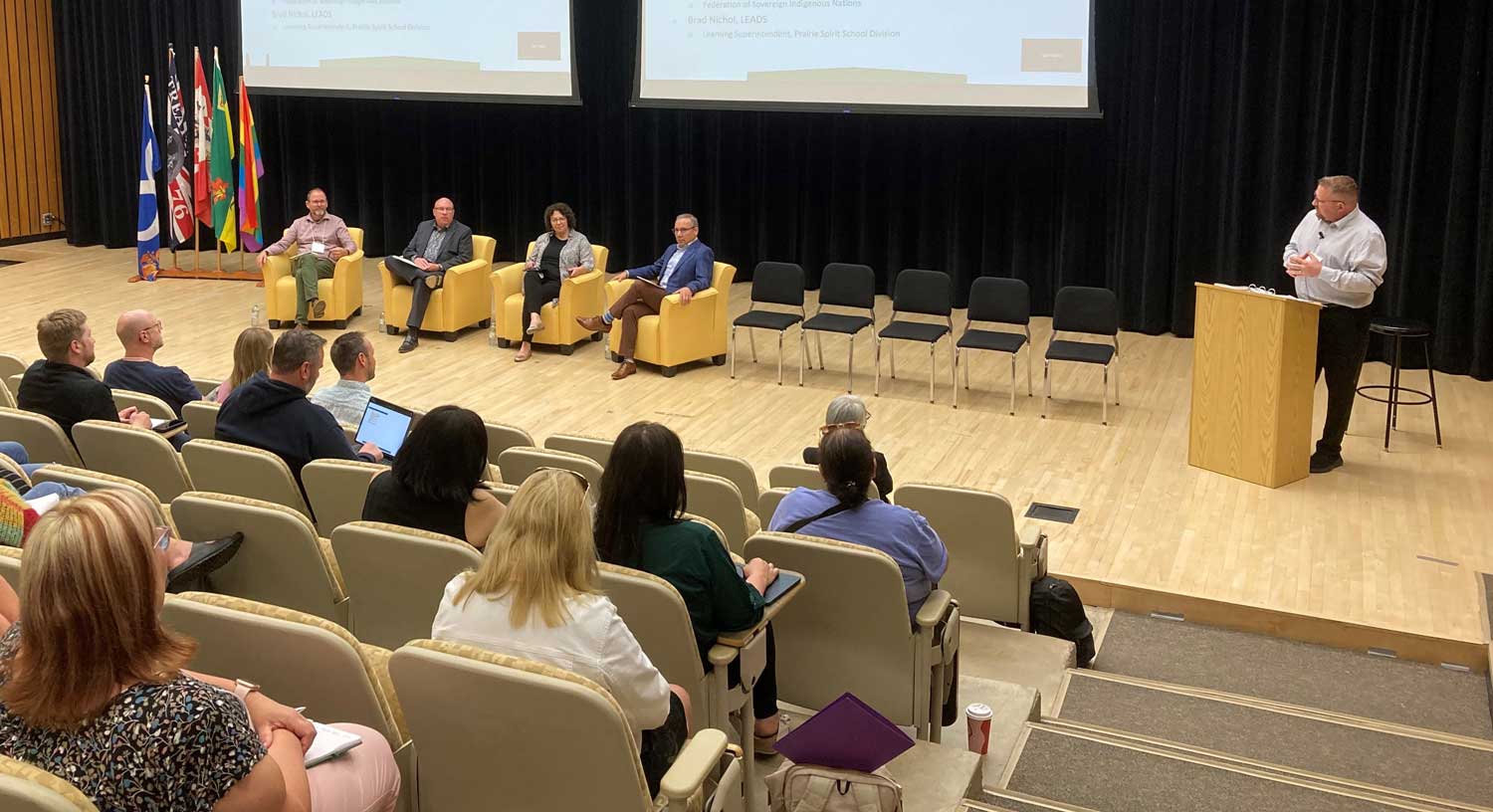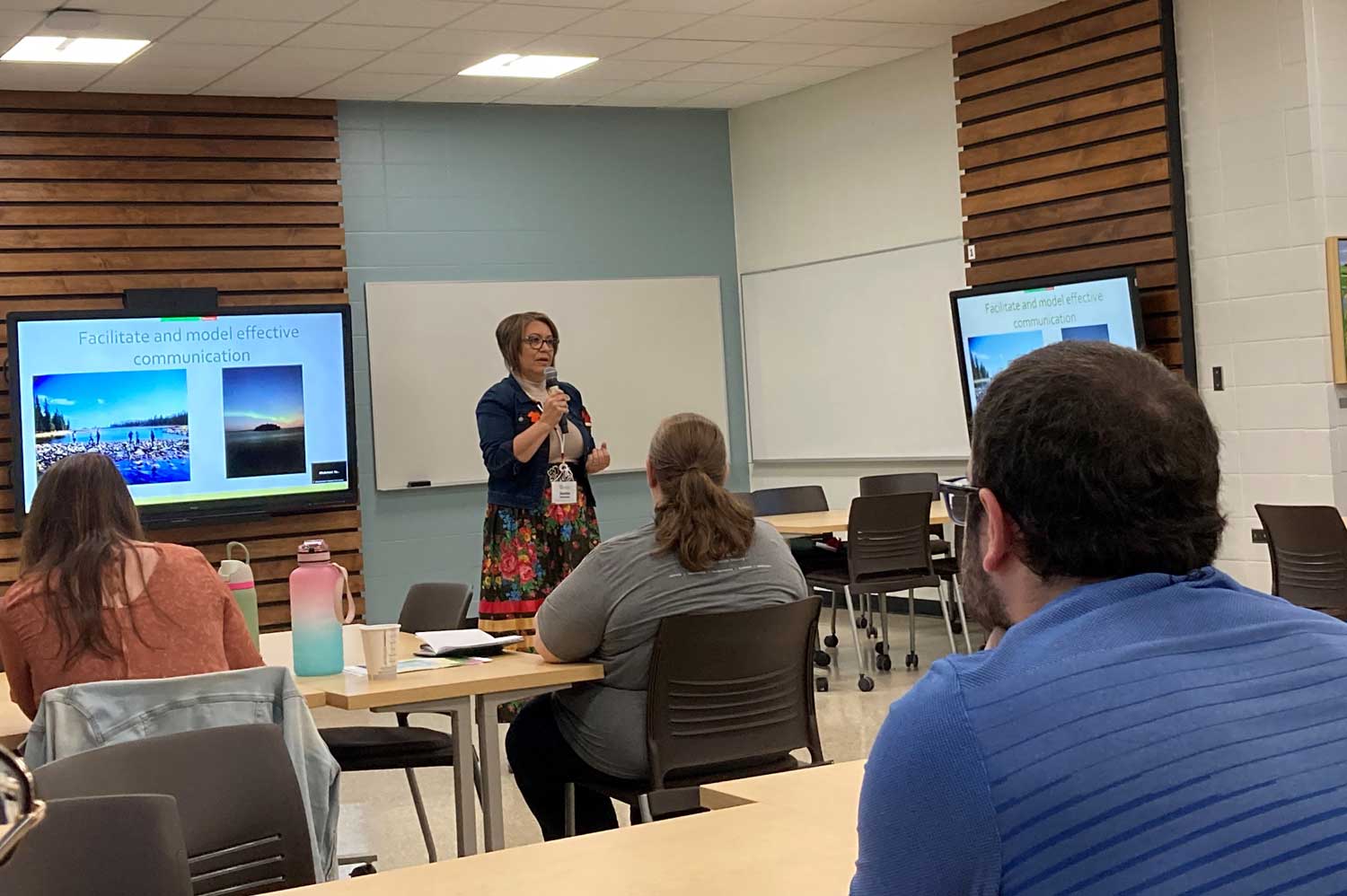
Purpose-driven leadership the focus of 60th annual course for school administrators
Course for K – 12 school administrators highlights ways collaborative, moral and innovative leadership enhances student engagement and learning.
By Meagan HintherHosted by the College of Education at the University of Saskatchewan (USask), the Saskatchewan Principals’ Short Course (SPSC) takes place annually the first week of July for newly appointed principals and vice-principals in provincial and First Nations schools across Saskatchewan and beyond. This year, participants joined in-person and online for the 60th edition of the professional learning week, held July 2 – 5. The conference was organized and coordinated by the Saskatchewan Educational Leadership Unit in the Department of Educational Administration.
SPSC director Dr. Gordon Martell (PhD), assistant professor in educational administration, offered insight into the theme chosen for the week – engagement, leading and learning – which opened with a panel exploring ways leaders can navigate complexity through collaboration and moral purpose.
“This week is not necessarily about resolving complexity in education, but rather understanding that we live in social flux. And that’s really a part of the experience [of leadership] that will be a persistent influence on schools, now and into the future,” said Martell.
Martell invited participants to explore a framework for leadership that focuses on engagement with the education profession, their communities, and lifelong learning. He shared that a growth mindset can help administrators develop the knowledge and skills to figure out how schools can best support the aspirations of society.
"If you think of leadership in these ways, then, ultimately, leaders are purveyors of hope, growth, and the values and attributes of a healthy and responsible, social-democratic society,” shared Martell.
The week’s activities included keynote speakers, breakout sessions and networking opportunities. Topics were varied over the four days and included how innovation can help administrators navigate change, how harnessing creativity and technology can help student success in the age of Artificial Intelligence, and how to grow a cohesive school culture through relationships. School leaders from across Saskatchewan presented many of the sessions and facilitated small group ‘fireside’ reflections to guide participants through the week.
“The design of the short course really focuses on networking and building relationships,” said Martell. “Fireside chats are an integral part of the conference, and we encouraged attendees to engage fully and use them as opportunities to build relationships.”
Jackie Durocher, an educator from Buffalo Narrows, member of the Lac La Ronge Indian Band and superintendent with Northern Lights School Division, participated as a small-group facilitator and presenter. This is her sixth time joining the course in this role and she sees it as an important opportunity to use her voice as an Indigenous leader in Saskatchewan.
“It’s a way to build connections. In my Indigenous ways of knowing we need to share what we have – it’s my way to share, learn and give back,” Durocher said.
What she is most proud of with the short course is the growth and change that has occurred with Indigenous participation. When she first participated as a facilitator, she recalls there was one other Indigenous facilitator and not many Indigenous participants. Now there are many First Nations participants—about one-third of the registered participants are administrators from First Nations Education Authorities.
“Those in my group are so open and they feel so accepted, and as an Indigenous person it makes me feel that we are on the right path – we’ve done what we set out to do to make them feel comfortable in this space,” shared Durocher. “[Indigenous people] need to see themselves reflected in doing this kind of work – in leadership. I’m hoping that one day some of the participants come back as facilitators. Which we are seeing.”
“We need to inspire and empower each other to be able to do this,” she added.
Following feedback received from facilitators like Durocher and participants, the course hosted ‘Kohkom’s Corner’ for the first time and had Elder Corine Eyahpaise join SPSC each morning with open availability for visiting and guidance.
“Elder Corine brings a wealth of knowledge, and she has such a calming effect on people. It was so important for us to defer to the wisdom of the Elders when we’re discussing leadership as Elders inspire our communities as guides and teachers,” said Martell. “Corine demonstrated care for all our delegates and contributed to a meaningful and relational learning environment.”
For many participants, the week was full of insightful content as they assume new or different leadership positions. Andrew Gallagher with Prairie South School Division has joined École Palliser Heights School in Moose Jaw as the new vice-principal.
“[I feel] truly inspired, from beginning to end. Not only did I learn something, but every single breakout, every fireside session, every keynote led me to question deeply the ‘why’ of what is going on in leadership,” shared Gallagher. “Some of it was reaffirming, some of it was brand new, and some of it was paradigm shifting. It was a powerful week.”
The idea of spending the first week of the summer in professional development may have been daunting for educators exhausted by the past year of teacher job action and uncertainty. However, for Gallagher, it was a refreshing week and one that left him recharged and ready for the year ahead.
“In the 32 years I’ve been in this profession, I’ve never been at such a dynamically charging – not just dynamically charged – but dynamically charging professional development,” Gallagher said. “Because it’s the first week of the summer, it’s a choice to be here. It doesn’t matter if we’re all tired or exhausted – we’re all here to learn and we’re all here to grow.”
“Every single vice principal, new principal, experienced or aspiring principal in Saskatchewan should do this course once every five years,” added Gallagher.
As Martell closed the conference, he reiterated the networks and support the week provides and emphasized his confidence in the newest leaders joining school administration.
“It’s not easy in the sector sometimes, there are a lot of pressures in First Nations education and in public education that need to be worked out,” said Martell. “But you’ll be the change agents. You’re kind, intelligent and you’re born leaders. You’ll get better over time. Give yourself permission to grow. You won’t know it all, and the SPSC has given you a network of experts at your disposal to reach out to anytime.”

Article re-posted on .
View original article.

